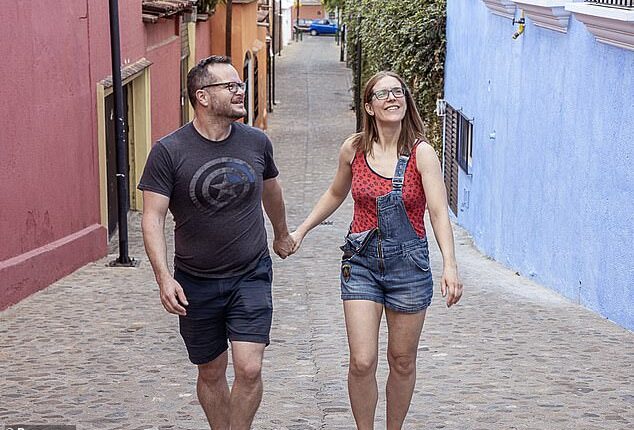A woman has revealed how she was able to save enough money to retire by the time she was 35.
Since reaching ‘financial freedom’, Katie Donegan, 40, and her husband Alan, 45, who are worth £2million, spend their time travelling the world and volunteering, offering free courses on how others can create a nest egg too.
The couple, who met while taking part in a volunteer project in Costa Rica in 2005, were both careful with money: after they got together, they lived with Alan’s mother, so they could save enough for a deposit on a home.
By 2010, they had saved £42,000, and bought a two-bedroom flat in Basingstoke which cost £167,650. In 2013, they tied the knot in a DIY wedding that cost just £12,000, enjoying the day with 180 guests, without draining their bank accounts.
It was in 2015 that they discovered the FIRE (Financial Independence Retire Early) movement, and set themselves an ambitious goal – to have £1million in investments in just three years.
It was an ambitious goal, even with the £291,000 they already had in their savings, but by implementing a range of money saving measures – like never using heating, not eating out, and always using coupons and vouchers, they were able to boost their bank account.
Around this time, Katie was working as an actuary, earning £58,000, and Alan was making £63,000 a year running training courses, helping professionals give presentations. In addition to saving, they focused on increasing their income. Katie took the bold step of quitting her job to work as a contractor, which would yield a bigger salary, and it paid dividends.
By Autumn 2018, the couple had saved £898,000, and they took the daunting step of investing it, opting for low‑cost global index funds, with the goal of living off the money generated by their investment.

Alan and Katie Donegan (pictured) have revealed how they saved enough money to retire young
Being on the same page when it came to finances and saving made reaching their ambitious goals easier. In the evenings, they would take long walks together, talking about tax, investing and financial independence.
‘We made a project list, learned how to invest together, and focused on making our gap between what we earned and what we spent as big as possible,’ Katie said. ‘Because our lifestyle was relatively modest and we kept our fixed costs low, the next step was to increase our earnings. We focussed heavily on that.’
Another benefit of sharing the plan was that the couple became closer. When they had decision to make, rather than having emotional arguments about what to do, they simply asked themselves one question: does this buy freedom?
‘Where it all goes wrong is where one of the family gets excited about budgeting, cost cutting and then forces it on the others,’ Alan said. ‘This is a sure fire way to turn off everyone around you about finances. How do we know? Because we have done it.’
Once they had a goal in place, they started to build their pot. There are different aspects to achieving this: there is saving money, and then there is generating additional income through investments.
Getting started with saving
Discovering the FIRE (Financial Independence Retire Early) movement equipped them with a simple ‘map’, featuring three distinct steps.
These are to create a gap between what you earn and what you spend; to invest the gap in low‑cost global index funds; and to aim for a money target rather than an age target.

Now the couple have the freedom to design their own lifestyle, they choose to travel, and to share free financial advice
When it comes to the third point, Alan explained: ‘We have all been trained to believe and to assume that you have to work until normal retirement age or state pension age. We discovered that you can ‘retire’ when you’ve hit a money amount and your investments cover your expenses.’
They set a clear target: they wanted to save 25 times their annual spending.
‘We tracked our progress against that target every month and we hit it in April 2019 when I was 35-years-old and Alan was 40,’ Katie said.
Stages of building a nest egg
The task of building such a large money pot can seem overwhelming, so the couple approached it in stages.
Stage 1: Get stable. Alan and Katie built an emergency fund first. They never had high-interest debt (anything over six per cent) but people who do need to pay off these debts ‘like their hair is on fire’.
Stage 2: Create a gap on purpose. They tracked every pound and asked if each expense added real value. They cut what didn’t matter and kept what did.
Simple habits made a huge difference. They batch-cooked, took lunches to work, and avoided lifestyle creep when income rose. Investing the money they saved with our lunch habit alone was worth about £40,000 over 10 years.

SAME PAGE: The couple have revealed how they were not on the same page with their financial goals at first, but once they were, it became easier
Alan said: ‘We watch friends have expensive takeaways week in and week out and then complain about never having any money. We were NEVER going to let that happen to us.’
Stage 3: Earn more. They looked for ways to increase income rather than only cutting costs. There’s a floor to cutting, but no ceiling to earnings. Alan started his own business in 2008 after losing his job. Katie quit her corporate job to be a contractor which increased her income.
This was a calculated risk – she had to quit her job before knowing if she had a contract but they knew we had enough savings to sustain them for many months if she didn’t find any work.
Stage 4: Invest the gap simply. Once they had a gap, they invested as much as they could as quickly as they could (whilst keeping their emergency fund). They used tax-efficient accounts like ISAs and SIPPs and chose low-cost global index funds.
The funds they own are Vanguard: the FTSE Global All Cap and FTSE Developed World ex-UK.
Katie said: ‘Investing is the only game in the world where the less you do, the more you earn. You just take your money, put it in, and let it grow.’
Stage 5: Keep costs and complexity low. Fees are the silent killer. A one per cent adviser fee sounds small but over decades it can cost hundreds of thousands. Katie once had a high-fee adviser, and if the couple had stayed with that setup, it would have cost them nearly a million pounds over our investing lifetime.
Stage 6: Measure and automate. The couple automated transfers on payday, so ‘future them’ always got paid. They held monthly finance meetings- always with a nice breakfast and coffee – to make it fun.

To make saving easier, the couple let themselves spend money – mindfully – on the things that were most important to them, while saving money on things that weren’t

While the couple don’t need to work, they offer free courses via their organisation, Rebel Finance School, saying that one of the things they need to be happy is ‘to create and to give’
Alan said: ‘It’s the highlight of our month. It keeps on track and focussed on living the life we want. We now have 10 years of tracked data for our finances (both spending and our net worth) which Katie loves to visualise with graphs.’
He continued: ‘We started with £200 a month. Compounding did most of the heavy lifting over time. Across our working lives we earned about £1.6 million between us and our net worth is now £2.5 million. That’s the power of consistent investing, low fees, and time in the market. We are worth more than we have ever earnt and spent money along the way. This still blows my mind.’
Gamify saving
Actually saving money can be more difficult than it sounds, so to make it easier, the couple decided to ‘gamify’ saving, giving themselves challenges.
‘We turned saving into a game – it was never about misery – it was about creativity and freedom,’ Katie said.
Among them was their heating challenge. Katie explained: ‘We didn’t turn the heating on in winter – except when my mum came round. Instead, we wore extra layers, used hot water bottles, and made it a game.’
She continued: ‘[Another challenge] was to never charge my phone at home. I carried a power bank and charged it while out. It didn’t save much money, but it was fun to see if I could beat the system.’
Their other endeavours included voucher hunting, with the couple going ‘full treasure-hunt mode’.

Earlier this year, the couple were awarded the British Empire Medal for services to financial education through their work with Rebel Finance School
‘We even dived into the Sainsbury’s bins next to the automatic checkouts and found £5-off vouchers when you spend £20,’ said Alan. ‘It felt like finding £5 in the rubbish. We got told off for that by the lady at the tills, but it was a fun game.’
They also downgraded their car for a smaller one, making significant savings on fuel and road tax.
Another area in which they made savings was in their social life. Instead of eating out, they invited friends to their home, they cooked all their meals at home, and date nights were low cost outings like picnics in the park.
Strategising
Strategy was key when it came to sticking with their goals, as well as communicating about how their finances were going. They did this by having monthly ‘finance dates’: they would have good coffee and nice breakfast, which they would enjoy while sifting through their data.
The couple also had what they called ‘walk and talk strategy sessions’.
‘After dinner we’d lap Basingstoke talking tax, investing, and financial independence,’ said Alan. ‘Walking, talking about having a joint goal inspired us constantly to work on things together. We came up with so many ideas walking round Eastrop Park.’
One of the main things they did that made achieving their goal possible was shifting their mindset. Alan explained: ‘We lived like no one else would for years so we can live like no one else can for decades. We knew the target, we knew the goal and we believed the people that had gone before us who told us it was possible.’

Focusing on the your goal is crucial when building your savings: Katie and Alan (both pictured) repeated a mantra to keep focused: ‘Buy your freedom first’
They even had a mantra they repeated daily: ‘Buy your freedom first.’
‘We were laser-focused on freedom, focussing on “why” made the daily actions easy,’ said Alan.
It wasn’t all about saving; they spent lavishly on this things that mattered to them. Alan explained: ‘A new BMW wasn’t important, so we drove a tiny car. What mattered was friends, good food and buying freedom, so that’s where we spent.
‘Saving doesn’t have to feel like punishment, for us, it became a shared adventure and it was super fun.’
Life after work
Having financial freedom means the couple are able to design the lifestyle they want, which they describe as being about freedom, adventure, and purpose.
Katie said: ‘In 2019 we sold everything, put our flat on the market, and became fully nomadic. Since then, home is wherever we happen to be. We have travelled to more than 50 countries, learned Spanish, hiked mountains, and explored new cultures. This year alone we spent time in Rio de Janeiro, Los Angeles, and Puerto Vallarta.’
Alan added: ‘A simple joy still makes me smile every day. No alarm clock. Waking up without one is amazing. Proper life goals.
‘We can choose not to work, and that choice is the point of financial independence. The retirement police sometimes say, “but you still work”. We bought our freedom so we can do anything we want to.’
They still track their spending, but have shifted from accumulation to decumulation when it comes to managing their money.
Before retiring, the decisions they made were made on building the gap and investing their money. Now, it is about making their money last for decades while still enjoying life.
When it comes to their investments, they keep them simple – just low-cost Vanguard global index funds (they noted they have no affiliation with Vanguard, but like wgatr the company does).
Alan explained: ‘It’s the most passive investment we’ve found, you put your money in, allow it to compound and get on with living your life.’
They ensure they withdraw money from their portfolio at a safe rate that means they don’t risk running out.
Katie said: ‘Our target was to live off four per cent of our portfolio each year adjusting for inflation. We have since come to realise that is quite conservative and it could actually be more like five per cent. We also keep a cash buffer for flexibility. That means we can ride out market dips without panic.’
They are also conscious of tax efficiency. Alan said: ‘Tax efficiency matters more now. We draw from ISAs for tax-free income and then General investment accounts to use up our annual Capital Gains Tax (CGT) allowance.
‘Once we’re old enough to access them we’ll use our SIPPs (Self-Invested Personal Pensions). Planning withdrawals is as important as planning contributions.’
Finally, they ensure they spend with intention.
Before making purchases, they ask themselves several questions: Does this give us joy? Does this improve our lives?
‘After several decades of training ourselves to be frugal and LOVE it, our challenge is now letting go of that training so we can enjoy what we have built to the full,’ said Katie.
‘We spend freely on what matters – travel, experiences, good food – and cut what doesn’t. That mindset hasn’t changed.
‘We manage money with the same principles as before: keep it simple, keep costs low, and make decisions based on values, not fear. The difference now is we’re experiencing the freedom and living the life we planned for.’
Finding financial freedom
Now the couple have financial freedom, they help other people achieve it, by offering free course through their organisation Rebel Finance School.
Earlier this year, they received the British Empire Medal for services to financial education through their work with Rebel Finance School, having been selected in King Charles’ birthday honours list.
They received these medals for helping people take control of their finances for free.
While they don’t need to work, they enjoy helping others. Alan said: ‘One of the things we need to be happy is to create and to give. So when people say yes but you’re still “working” our answer is simple: we bought our freedom so we can do anything we want to, and we have realised contribution and growth are key to long‑term happiness.
‘That is why we volunteer our time teaching money through Rebel Finance School. Money is not the goal. Money is the tool that lets you spend your life on what matters.’
Katie added: ‘We give away a free 10-week course because we want to help. There are no upsells. It actually costs us money to run it each year and we choose to do it anyway. More than 50,000 people have taken the course so far, and this year alone 35,000 people from 60 countries joined us.’
The couple share free advice on saving and how to manage money via their organisation Rebel Finance School. They have a website, and can also be found on YouTube.








